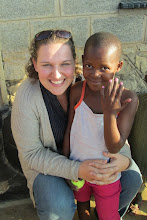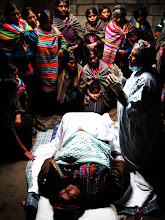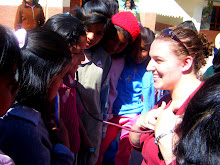My delight that my students are moving out of the "terrified deer-in-headlights" phase and into relative comfort with me has been quickly curtailed by the presence of a new frustration. They're getting comfortable with me, and hence pushing the limits of what I will allow in my classroom. While some classes are further along in "testing the boundaries" (particularly my Form B students), I imagine all of my classes will, at some point, follow suit. In the case of my Form B's, they (especially the girls) delight in mimicking me, whispering during class, and speaking Sesotho (which is strictly forbidden at the High School, and is of further insult because I can't understand what they are saying.) Needless to say, it has to stop.
My exposure to Basotho techniques for discipline at my school thus far, however, has not left a wide range of options for my use. This is because the prominent method of discipline (for most rural schools in Lesotho, including mine) is corporal punishment. I should preface this by saying that all of my Basotho colleagues are wonderful, caring people, but corporal punishment (for anyone whom this practice offends) is the cultural norm. It is commonly practiced at home and at school. Teachers regularly carry sticks (of varying lengths, and sometimes surprising widths) as a form of intimidation both within and outside of the classroom. Students are beat for a range of infractions, from arriving late to 7am study or the daily assembly, for talking in class, for late assignments, or just generally for being rowdy or uncooperative.
As many Americans are aware, it is against the law in the U.S. to beat a child at school, and culturally, many Americans even believe it is unethical to beat, swat, or spank your own child at home. For all PCV teachers in Lesotho, these disparate views make for a prominent cultural difference. As volunteers, however, we all come from a wide range of belief systems and upbringings. For some, the mere mention of corporal punishment illicits very strong emotions, while for others (like myself), corporal punishment is tolerable or, at a minimum, rationalized. As a child, I admit to occasionally being on the less pleasant end of a spanking from my father. Today, I consider myself a well-adjusted adult and no worse for wear because of a little physical punishment. So while I would never beat a child with a stick (especially a child that was not my own), I understand that it is the cultural norm here, is unlikely to do any permanent harm (if applied judiciously,) and either way, is a Basotho child-rearing practice that is not going change anytime soon.
Even if I was disposed towards disciplining students with a stick (which, for the record, I am not,) it would not matter. As a Peace Corps Volunteer, I am held to the laws in both my host country (Lesotho) and the U.S. So in short, it is illegal for me, as a teacher, to engage in corporal punishment (a fact I have to consistently remind my colleagues when I am offered a stick, and looked at expectantly.) Yet I still have a growing discipline problem. I am stubbornly determined to prove to my colleagues that there are effective alternatives to wielding a stick, and to prove to my students that I am not to be toyed with.
Options that might typically be available to me in the U.S are very limited here. I cannot hold children after school, as many have to walk several hours to get home before dark. There is no detention, and sending a child to the Principal would just be the equivalent of having someone else wield the stick for me. Students here are surprisingly nonchalant about grades, as many fail anyway or drop out- so deducting points is also unproductive. Taking away lunch would be cruel, as for many of my students (especially orphans) it is the only meal they can expect to have every day. Yet I am slowly learning some "tricks of the trade" firsthand and from my PCV peers.
For one, students here HATE being dirty. The idea of soiling an expensive school uniform unnecessarily is repulsive. They also HATE speaking in public. So latecomers to my class are now punished with a good dose of embarrassment when I demand they explain their tardiness to the class/me, and then sit on the floor for the rest of the class. For talking in class, another form of public mockery- standing in the corner with your nose to the wall.
I wish I could say that these tactics have been enough, but it seems they are not. So this morning in my Form B Math class, I finally snapped and pulled out an age old weapon passed down from mother to daughter through the ages... My most menacing mom voice. When combined with a look that chills a child to the bone and an air of extreme disappointment it is proven highly effective- or at least, I hope. I threatened them with the loss of some lunch?break-time the next day... (A rather shocking punishment for them, that I'm hoping will rally the class to police itself lest they have no break during a 9 hour school day) We shall see if it proves enough to strike respect into their young hearts. By the looks on their faces when I left the classroom in a threatening and angry silence, they seem to have gotten the message... Me' Limpho will not be disrespected. But I'm certain the time will come soon enough when I will have to follow through on an awful, horrible promise of "no break" or manual labor during lunch-time. When that time comes, I'll keep my promise... Because I may not have a stick, but I'm confident there's more than one way to discipline a child. :)
With Love from Lesotho – Mary E.






No comments:
Post a Comment